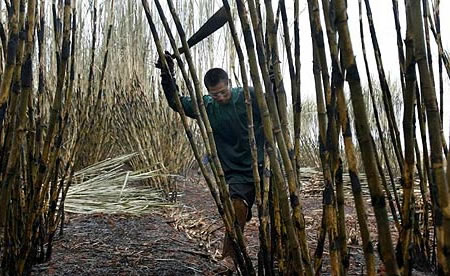Brazil sugarcane workers are soon to feel the corporate axe

Brazil sugarcane workers are soon to feel the corporate axe, Brazilian Sugar Cane Industry Association (UNICA) said 80% of the 500,000 jobs would be gone within three years and admitted that moving to a tractor-based system would cause pain and upheaval for its migrant workforce. Behind the move to phase out sugar cane cutters are tales of exploitation that have damaged the image of Brazilian biofuels in big importing countries such as Sweden and potentially in Britain, where the government has mandated that 2.5% of all petrol come from biofuels. The condition of sugar workers was rarely noticed when the commodity was exported for sugar but the position has changed now that Brazil is the world’s second-largest exporter of sugar-based ethanol to use as a biofuel in petrol. Sugar cane cutters who have been working Brazil’s land since 1525, when Portuguese colonialists first experimented with growing the crop, are to make way for mechanization. Manual labor is also blamed for poor environmental practices such as crop wastage and the burning of stubble.
Mechanized systems will be able to harvest more of the crop and allow Brazil to use by-products for powering electricity plants, argues UNICA. Critics have accused Brazil’s sugar cane industry of presiding over child labor, high accident rates and workers earning as little as $1.35 (67p) an hour. Employers insist that pay is three times that level. Brazilian ethanol output grew by nearly a quarter during 2007 to a record 22bn liters, with around 4bn being exported, and the government had great anticipation of marketing its exports as biofuels. This however is a move that could backfire as the corporate food for fuel preference will harm supply of basic food necessities to those who need it as the demand for bio fuel rises.
Source